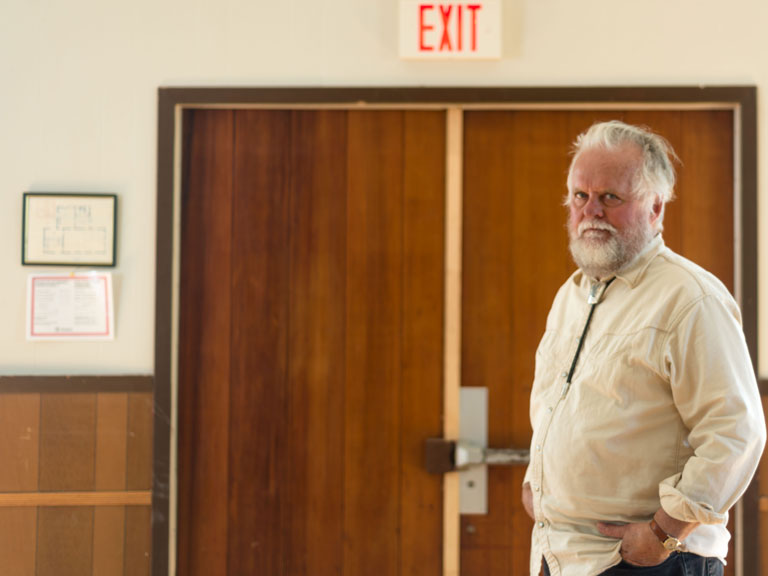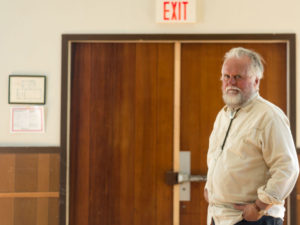County News
Pyrotechnics

County culture clash creates drama over no theatre
In 2014, a slow leak in a 150-year-old roof began a chain of events that threatens to crush creative endeavours in a place where performance spaces are few and far between.
It started with the ceiling in Hillier Hall. A drop ceiling, installed in the 1960s, had begun to crumble, along with the plaster it hid, when the hall’s roof began to leak.
The Hillier Recreation Committee saw an opportunity to go beyond a simple fix and expand the hall’s potential. (In the interest of full disclosure, the author was a part of the HRC at the time.) Instead, they put together a proposal: restore the hall’s historic vaulted ceiling. Add electrical outlets and crossbars to attach lighting, and 500-pound load-bearing fly hooks that could be used for hanging all manner of things, including a ring for gymnastics training, offered by Zero Gravity Circus. That company’s owner had just purchased a property in Hillier and had expressed interest in offering workshops.
The HRC offered community-raised funds to cover the cost of any work beyond that of replacing the damaged ceiling.
Then came the pushback.
County staff objected. They were concerned about liability issues with the added electrical and the use of use of the hooks for human beings, misunderstanding the intended use of the hooks, that their use was a “high risk activity and therefore not an appropriate use” of the hall.
The Hillier Women’s Institute objected, fearing the change would destroy the hall they use frequently, misunderstanding the potential for theatrical use to mean the hall would be converted into a theatre, similar to Mount Tabor.
Then, after a year of discussions, engineer’s drawings and delays, the hall reopened, with the cross-bars and hooks installed, using HRC’s contribution.
In the fall of 2016, HRC member Conrad Beaubien set up a temporary stage, hung lights on the crossbars and mounted a performance of an original play he had written, Bridge Street.
Just before the first performance, the County’s operations manager, Preston Parkinson, visited the Hall, informing Beaubien and the others involved in the play that what they were doing was in contravention of fire code. A one-time exception would be made, with two firefighters assigned to each performance, on the County’s dime.

Conrad Beaubien stands by a fire exit at Hillier Hall.
Then Beaubien contacted Parkinson, hoping for information about how to get the building up to code for public performances. For months, there was no answer. Then, in March, a grim and definitive one: he can’t. Not without turning Hillier Hall into a dedicated theatre space.
“In 2012, due to concerns raised by the County’s fire department regarding town hall usage, the County reviewed the requirements and determined that none of the town halls would be improved for theatre productions, due mainly to budget constraints,” the letter read.
Parkinson referred to Milford’s Mount Tabor as an appropriate theatre space.
This frustrated Beaubien, who appreciated the hall’s purpose as a mixed-use community space.
“This is a general assembly building. It’s [been] coded that way since 1867. You paid your taxes, they had dances, they had plays. The old people still remember that. It’s always been this,” Beaubien says. “We’ve never envisioned this as being a playhouse. And if you ever hear somebody try to [draw a comparison] to Mount Tabor… they’re not even in the same body of water.”
Engineering commissioner Robert McAuley says it was what Beaubien wanted to do that was at issue.
“If you were to stand on the stage at Hillier Hall and have a group of people listen to you read a book, is that a theatrical performance? I don’t know if fire code says it is,” says McAuley. “But if you are up on that same stage and you have all these lights and AV up, and maybe you’ve got some things going on that’s quasi pyrotechnics, that classifies as theatre.”
Beaubien, who has no intention to use pyrotechnics, says he never spoke to McAuley.
“How can he come up with that? How could somebody state that without ever sitting down face to face and asking those questions? He answered me directly, once, in an email.”
His definitions are murky, however. He says the load-bearing hooks could be used to hang artwork, quilts or a disco ball, but not a human being. And that the crossbars could be used to hang lights, just not to shine on people.
“If [the HRC] were holding a quilt show, maybe they want the light to display the wall quilts or something. There are other ways. It could be pointed on artwork on the walls. There’s other uses for it beyond what Conrad wanted,” says McAuley. “It could be used other ways, so the work was done. It’s what Conrad wanted to do with it takes it over the edge. If the Hillier Rec wanted an art show, I don’t know that would be an issue. That’s just a common assembly occupancy.
There are degrees of theatre. If you stood there and we shone lights on you and you read a book, is that theatre? In some people’s minds it is, and in some people’s minds it isn’t.”
But in 2015, as the HRC was gathering engineering plans for the County, as they met with County staff and community members to explain the plan, temporary theatrical performances were part of that. Part of the reason for the $6,200 that was given to the County. Part of the reason for the year-long delay in finishing the damaged hall.
McAuley raised political aspects of the issue.
“We know what we have to do to get it to that level. Does council want us to take it there? Is that the intent of the hall? Do we want to do a plan, make another theatre? We have two already,” McAuley says.
And that, Beaubien responds, is the discouraging thing.
“That is such a misunderstanding, and makes me so sad. And here’s where I think the core of the issue is. I take that directly as an insult, that somebody would say that who has never spoken to me, who has never heard that from anybody here. Who has never spoken to anybody in the arts community, what do we want to do here? So it really confirms that they have a misunderstanding of what we want to do here.”

As rate payers and Hillier residents, we need to assure that our town hall is used for the activities we support. Theatre, especially community theatre with neighbours, friends, and children performing in locally written productions is an important and valuable part of life in a small community. Young people, families, and artists need space to develop their creativity, talents, and skills. If someone wanted to put on a Christmas play, would that be banned? If someone wanted to bring in a small theatre troupe to entertain children, would that be banned? If young people wanted to rehearse a performance for Hillier day, would that be allowed? The fish fry is a wonderful community event that we all love. Is that going to be banned? It seems to me that the number of people crowded into the hall and the amount of hot food and beverages being served creates far greater potential for challenges than a theatrical performance. I need to know who should be contacted to best express my concerns. I have already emailed Mr. Graham, our councillor, and am waiting for a response. I am just getting up to speed on this and very much want to help encourage the continuation of the arts in our community.